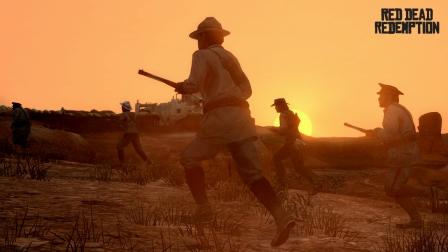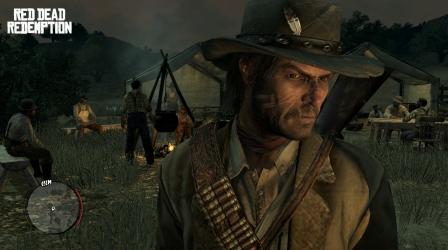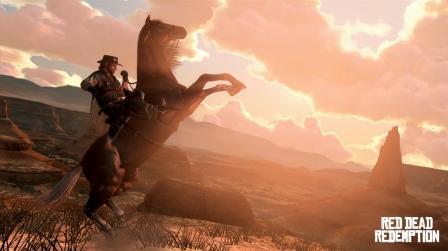Unless you've got a 50-inch plasma hooked up to your Xbox, that is.
Earlier this year Mass Effect 2, the second installment in Bioware's sci-fi epic trilogy, lit up gaming consoles around the world to rapturous acclaim. Time magazine declared the third person shooter*/role playing adventure game hybrid better than cinema offering Avatar.
And it was.
Mass Effect 2 had a deeper story, better character development, and a more ambiguous morality. Ironically, the one category that Avatar ran away with was in the visuals. (Even acting: Sigourney Weaver's performance in Avatar was great, but she didn't display the range of Mass Effect 2's co-main voice actor Jennifer Hale.)
It was with this high standard in mind that I approached Red Dead Redemption, the "spiritual successor" to 2004's cult favorite Red Dead Revolver.
Red Dead Redemption is set in early twentieth century America. The old West is dying. Train tracks are bisecting the land. Player controlled protagonist John Marston is a former outlaw pressed into service by unscrupulous federal agents. The feds have Marston's family and they want his old partners in crime. The game opens with a taste of the mordant wit with which it is laced throughout: as Marston sprawls over a seat in a train and we are treated to wide open Western vistas, two old biddies complacently agree that the genocide of the Native Americans was well justified in bringing them to God. "They may have lost their land," says one, "but they gained their souls."
As a former anarchist, Marston now approaches the world wearily and warily. He accords earnest revolutionaries and snake oil salesmen the same skepticism. Yet, if he's a reluctant hero, he's still a hero. He rescues the idealistic young revolutionary Luisa and when her father is killed, he helps her take revenge even though he disputes her contention that her father's death has a greater meaning.
"What it means," Marston corrects her, "is that war is brutal and cruel and good people die for no good reason."
Yet, as Mexican revolutionary Abraham Reyes observes, Marston is "a romantic trying to be a cynic." The game's storyline supports this view. The former outlaw is now weary of involvement with any cause or crusade. Yet he (and the player) are repeatedly pressed into service by a wide variety of would be allies who have threshold demands for their service and strangers with requests.
In between the excellent story elements, the "ludic" or play narrative affords the freedom to do a variety of activities. If you want to be a psychopath, you have the freedom to do so--though not without consequences. Walk into a town with guns blazing and the local authorities will respond. Each death raised your "wanted" and "bounty" level. When it gets high enough, bounty hunters will try and bring you in, a brilliant reversal of one of the optional missions in which you hunt down wanted criminals.
I suppose I should say a few words about Red Dead Redemption's graphics. They are quite stunning. But in this case, a picture is worth a thousand words.
Red Dead isn't perfect. The shooting mechanics are sometimes cumbersome when you're riding your horse and the difficulty slider applies only to targeting, making encounters too easy for some players and likely too difficult for others. I kept the game in expert target mode not to make life more difficult for myself, but rather to avoid clearing rooms of civilians when I drew my weapon and it auto-targeted a nearby innocent. (The reactions of civilians to you drawing your weapon are well done and gratifying.) The controls are not exactly intuitive, either, a natural side effect of a game in which there are so many minigames.
Red Dead's soundtrack, composed by Bill Elm and Woody Jackson, is exceptional--a deft homage to the traditional Western with its own character. Twangy and understated most of the time, it becomes edgy when danger is afoot, and pulsates when the bullets are flying. It can stand with the soundtrack of any major cinematic production.
The voice acting is similarly outstanding. John Marston can be safely entered into the canon of Western anti-heroes. As Marston, voice actor Rob Wienthoff manages to convey real depth of emotion without chewing scenery. Other stand outs include the portrayals of a weasely snake oil salesman, a truly bizarre grave robber, and a gay Mexican army officer.

Yet too much of the dialogue sounds artificially serene, like a conversation in a tea room is being conducted on horseback at full gallop. And the character of Irish is simply a shameful Orish stereotype. I kept waiting for something to be revealed beyond the surface impression of a fast talking drunk, but Irish is just....Irish. He's no Kaiser Soze.
And one can admire the brilliant variety of the game without credulously repeating the mantra that games like Red Dead Redemption are random "sandboxes" for players to frolic in.
In fact, Red Dead Redemption has a main plot that is completely linear and offers no meaningful choices whatsoever. (This doesn't detract from its entertainment value, but it is worth noting.) The way in which you are able to interact with game world characters is fairly limited as well. Minor characters you can shoot or run over, play games with, rescue, or tip your hat to. That's about it.
With major characters you have arguably less choice. You run to the spot marked x and a cut scene begins, after which you follow their instructions. Every once in a while you are able to choose whether to shoot someone or set them free or whether to help bandits rob a stagecoach or help the stagecoach defend itself. And while there are a vast number of "random" encounters, they are hardly random. Intermittently timed and triggered would be a better descriptor.
Still, it's an amazingly huge world.
Red Dead Redemption has at least seven distinct types of playable encounters and mini-games, with hundreds, if not thousands of permutations. There are main quest missions, side quest missions, intermittently timed and triggered repeatable encounters, repeatable pay jobs, "challenges," duels, and games of chance and skill. A friend told me, "I am addicted to Red Dead. I played poker for two hours last night." I laughed until I spent an hour and a half playing liar's dice. After playing the game for more than 30 hours, I still haven't found the time to arm wrestle, for instance. There's also a lively multiplayer experience. If you could play poker or liar's dice online with your friends in Red Dead Redemption, I might just move to a jurisdiction where I could marry it.

The main quest missions advance the plot and are not repeatable within the main storyline. You can, however, choose to repeat any of the missions from the in game menu at any time, creating a fun way to revisit particularly amusing sequences. Ditto "gang hideouts," basically a location based set encounter, which give you a chance to mow down swathes of criminals time and time again. Stranger requests are self contained mini missions that provide variously humorous, morbid, or touching expansions of Red Dead's richly populated world. They all end abruptly, which sometimes leaves you wanting more.
In one case, a woman asks you to track down her groom, who has disappeared the day before their wedding. Comes to pass that the groom has been dead 20 years. In a Bioware game, you'd get to run back to the lady and have some kind of final conversation. "Well, ma'am looks like he's actually dead, guess you must be insane. Cool, well have a nice day." In Red Dead Redemption, the mission ends when you discover what's happened. I'm not sure if this is better or not, but that's the way it is.
A lot of the quests are what are derisively referred to in the gaming community as "Fed-Ex quests." You have to pick this up here, drop it off there, and then return here. But they are well done enough in Red Dead that I rarely minded.
Sometimes the side quest missions disrupt the continuity of the main mission. In the worst instance, one set encounter (location based) overlapped with a "stranger request" encounter. To get to the stranger request encounter, I would have to undertake the location encounter. Only problem was the location based encounter conflicted with main quest scripted events that had already taken place. Without spoiling anything, it would have forced me to side with my then declared enemy against my then declared friends. It would have had no effect on the game dynamics, but it didn't feel right.
Red Dead Redemption is brilliant, however, in reversing your moral suasion from time to time. What do you do when a woman lures you into a trap with bandits? Execute her along with her pals? Or buy her explanation that she was forced into it? And then there's the issue that any good doer has when he crosses the border into Mexico. When confronted with my first Mexican Army firing squad, I jumped in to save the victim only to be stunned when I was hit with "Wanted" status and a bounty on my head. Then I realized: the bad guys are in charge here. It's a great way to reverse expectations.
Quibbles aside, Red Dead Redemption is one of the most satisfying entertainment experiences I have ever had. The always brilliant and rarely wrong Roger Ebert has declared video games can never be art, but if I had a 13 or 14 year old, I would rather he or she had an Xbox or PS3 and a copy of Red Dead Redemption to play instead of spending his or her summer at the multiplex.
Red Dead Redemption appears destined to go down in history as one of the best video games ever made. I'll go further: it deserves a place in the Western canon.
Rated M. Xbox 360 and PS3. You can shoot nuns and tie women up on the train tracks, but you can also save the innocent and spare sinners.
Bart's Xbox Live gamertag is Black Bizart.
*An earlier version of this article incorrectly called Mass Effect 2 a first person shooter/rpg hybrid. It is, of course, a third person shooter. Thanks to Huffington Post commentator Changeling for the correction.
